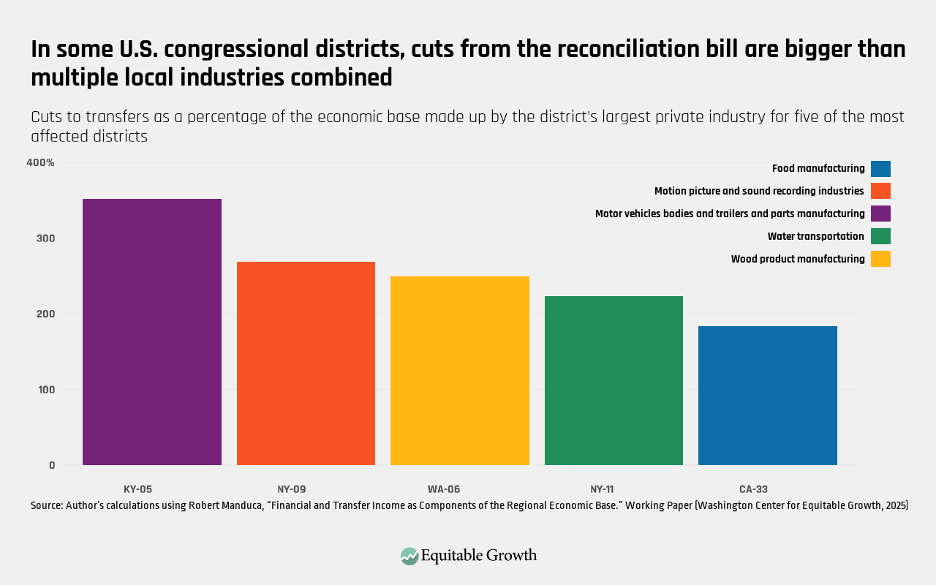Republican reconciliation bill’s cuts to social programs will damage some congressional districts’ local economies

In a recent working paper, Equitable Growth grantee Robert Manduca of the University of Michigan, Ann Arbor demonstrates that government transfers make sizable contributions to local economies in much of the United States—and, in many places, comprise a larger part of the local economic base than the largest local private industry. This finding is relevant following the passage of the Republican budget reconciliation bill, which makes extensive cuts to Medicaid, the Supplemental Nutrition Assistance Program, and other social programs. In addition to direct impacts on Americans’ access to health care and food, the cuts to social programs will prevent money from circulating among local businesses in affected regions and damage these regions’ economies.
The economic base of an area is typically defined as the portion of its economy that brings money into the region from the outside world, which then circulates through the local economy. In his working paper, Manduca provides the example of a manufacturing plant that exports its goods to an international market, but he also points out that the earnings entering and circulating in a region do not come exclusively from exporting locally produced goods.
Indeed, payments to individuals from national or state governments or from private sources, such as dividends, also contribute to the local economic base. From this perspective, the loss of such transfers to households within a region also are a reduction of its economic base and can be compared to the impact of losing private industries in the area.
In several congressional districts, Manduca actually finds that the resulting loss to the economic base from cuts in the Republican reconciliation bill will far exceed the revenue generated by the largest local private industries. In Kentucky’s 5th congressional district, for example, which has historically been ranked as one of the most impoverished districts in the United States, the losses in transfers income will be 3.5 times larger than the economic contributions of the district’s most profitable private industry, motor vehicles manufacturing. The same is true for many other districts across the United States. (See Figure 1 for a handful of examples.)
Figure 1

Even in places where the cuts represent a relatively smaller percentage of the economic base, transfers are still significant contributors to the local economy. These data reinforce how vital government transfers are to local economies and how some congressional districts will experience severe economic damage as a result of the reconciliation bill—including districts whose representatives voted in favor of passing the bill. Not only will the cuts to social programs affect the specific households that will lose out on access to health care and nutrition assistance (among other programs), but the reverberations will be widespread across many local regions and their inhabitants, too.
Download the dataset used to make the calculations in this column. Derived from Manduca’s research, it compares the projected losses from these cuts to government transfers with the contributions of private industries across U.S. congressional districts. The dataset, ranked by which districts will be hurt most, can be used to see how the reconciliation bill may financially impact every congressional district in the United States and how the cuts compare to each region’s most important industries (the first and second largest private industries in each district).
To dig deeper on the research or methodology, see Manduca’s original column and working paper.
Did you find this content informative and engaging?
Get updates and stay in tune with U.S. economic inequality and growth!




Stay updated on our latest research